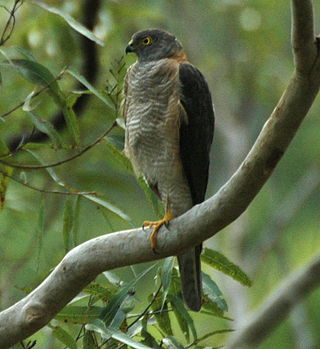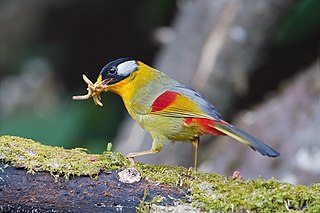
The International Union for Conservation of Nature (IUCN) Red List of Threatened Species, also known as the IUCN Red List or Red Data Book, founded in 1964, is an inventory of the global conservation status and extinction risk of biological species. A series of Regional Red Lists are produced by countries and organizations, which assess the risk of extinction to species within a political management unit.

Buteo is a genus of medium to fairly large, wide-ranging raptors with a robust body and broad wings. In the Old World, members of this genus are called "buzzards", but "hawk" is used in the New World. As both terms are ambiguous, buteo is sometimes used instead, for example, by the Peregrine Fund.

Accipiter is a genus of birds of prey in the family Accipitridae. With 49 recognized species it is the most diverse genus in its family. Most species are called goshawks or sparrowhawks, although almost all New World species are simply known as hawks. They can be anatomically distinguished from their relatives by the lack of a procoracoid foramen. Two small and aberrant species usually placed here do possess a large procoracoid foramen and are also distinct as regards DNA sequence. They may warrant separation in the old genus Hieraspiza.

The snowcocks or snowfowl are a group of bird species in the genus Tetraogallus of the pheasant family, Phasianidae. They are ground-nesting birds that breed in the mountain ranges of southern Eurasia from the Caucasus to the Himalayas and western China. Some of the species have been introduced into the United States. Snowcocks feed mainly on plant material.

The brown honeyeater is a species of bird in the family Meliphagidae. It belongs to the honeyeaters, a group of birds which have highly developed brush-tipped tongues adapted for nectar feeding. Honeyeaters are found mainly in Australia, New Guinea, and parts of Indonesia, but the brown honeyeater is unique in that it also occurs on the island of Bali, making it the only honeyeater to be found west of the Wallace Line, the biogeographical boundary between the Australian-Papuan and Oriental zoogeographical regions.

The Sunda scops owl is a small brown owl native to the Sunda Islands.

The grey-eared honeyeater, also known as the dark-brown honeyeater, is a passerine bird of the honeyeater family which is found in Vanuatu and New Caledonia in the south-west Pacific. It is sometimes known as the silver-eared honeyeater, but this name is also used for the silver-eared honeyeater of New Guinea.
This article is a list of biological species, subspecies, and evolutionary significant units that are known to have become extinct during the Holocene, the current geologic epoch, ordered by their known or approximate date of disappearance from oldest to most recent.

The silver-eared mesia is a species of bird from South East Asia.

The silver-eared honeyeater is a species of bird in the family Meliphagidae. It is found in New Guinea. Its natural habitat is subtropical or tropical mangrove forests.

Lichmera is a genus of bird in the honeyeater family Meliphagidae.
The Buru honeyeater is a species of bird in the honeyeater family. It is endemic to Indonesia. Its natural habitats are subtropical or tropical moist lowland forests and subtropical or tropical moist montane forests.

The flame-eared honeyeater, also known as the yellow-eared honeyeater, is a species of bird in the family Meliphagidae. It is found on Timor island. Its natural habitats are subtropical or tropical moist lowland forest and subtropical or tropical moist montane forest.

The scaly-crowned honeyeater is a species of bird in the family Meliphagidae. It is endemic to Indonesia, where it occurs in the Lesser Sunda Islands. Its natural habitats are subtropical or tropical moist lowland forests and subtropical or tropical moist montane forests.

The Seram honeyeater is a species of bird in the family Meliphagidae. It is endemic to Indonesia, where it occurs on Seram in the southern Maluku Islands. Its natural habitat is subtropical or tropical moist montane forests.
The black-necklaced honeyeater or black-chested honeyeater is a species of bird in the family Meliphagidae. It is endemic to Wetar.

The scaly-breasted honeyeater, also known as the white-tufted honeyeater, is a species of bird in the family Meliphagidae. It is endemic to Indonesia, where it occurs in the southern Moluccas. Its natural habitats are subtropical or tropical dry forests, subtropical or tropical moist lowland forests, and subtropical or tropical mangrove forests.

Sugomel is a genus of bird in the honeyeater family Meliphagidae.















